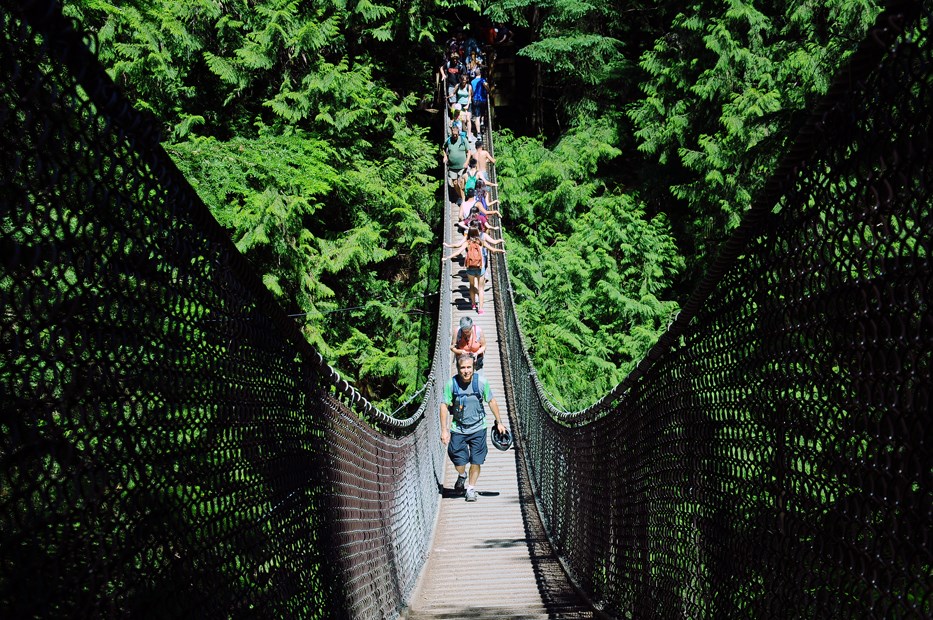Free parking at Lynn Canyon Park will soon be coming to an end.
District of North Â鶹´«Ã½Ó³»council voted in favour of endorsing a pay parking pilot at the popular North Shore tourist destination at its Jan. 25 general meeting.
The district will begin charging vehicle owners $3 per hour, for a maximum of three hours, to park at the Lynn Canyon parking lot seasonally from March 1 to Oct. 31. Be warned, overstaying your welcome or failing to pay for parking before hitting the trails will result in a fine of $75.
However, district residents will have the option of buying an annual park pass for $10, lowered from $30, to exempt them from the parking payment, with the requirement that park passes are displayed in vehicles. Those with a disability card will also be exempt from the fee.
Council voted five to two in support of the two-year pilot, with the hope it will help better manage demand and encourage visitors to try more sustainable modes of transport to get to the trails and enjoy the canyon.
Before the pandemic hit, the park, which offers stunning canyon views while crossing a free suspension bridge, was getting one million visitors per year. That amounted to about 2,500 vehicles per day during peak season, jockeying for about 100 parking spots. The district has since paved and expanded the lot to offer 129 stalls.
Staff highlighted the growing popularity of the park had resulted in “considerable strain not only on park trails, stairs, boardwalks, and supporting amenities but also on surrounding neighbourhoods from spill-over parking demand.”
Pay parking will generate funds for Lynn Canyon Park maintenance
It’s estimated the pay parking will generate between $250,000 and $480,000 per season, which will go toward park maintenance, operations, and possible future initiatives.
Councillors views on whether district residents should have to pay to park at the popular spot was a bit of a mixed bag.
While still in support of the pilot going ahead, Coun. Betty Forbes said she was “disappointed” the district annual pass was going to cost $10.
“I brought that up a couple of times, and I think I was the only one that was in favour of residents not getting charged at all,” she said. “We could have mailed out a sticker or something to hang from the windshield.”
In stark contrast, Coun. Mathew Bond voted against the pilot because district residents aren’t being charged the $3 hourly parking fee like everybody else, saying “paid parking should apply equally to anyone that's coming to park their vehicle in the park.”
“I still hold the unpopular opinion that having a resident exemption kind of defeats a lot of the purpose of a transportation demand management strategy,” he said.
“I don't think it's necessarily fair to ask residents from the City of North Â鶹´«Ã½Ó³»or from Burnaby to try and reduce their auto use to come to the park when they live farther away when we're not asking the same thing of our residents.
“We should be leading by example, not getting a free pass.”
Coun. Megan Curren also voted against the pilot, agreeing with Bond’s position on pay parking and advocated for more to be done to get the message across to the community that “everyone needs to be involved in this change” to help reach the district’s climate goals.
Meanwhile, Coun. Jim Hanson strongly backed the position for a resident exemption, saying residents had "effectively already paid for that parking" through property taxes.
Mayor Mike Little supported the pilot and suggested there were also further discussions to be had on using parking technology to find out what hikes and trails people parking were doing to better help safety and rescue organizations locate people if something were to go wrong. He said the $10 annual pass would also help give the district a better idea of how many residents were regular park users.
“This is in my view a pilot. It's going to have to justify its existence, before both its existence is continued and if potentially, we use it to roll out into other areas,” he said. “I'm looking forward to the data return that we get out of this.”
“I understand how frustrating it is going to be the very first time someone shows up for their daily hike, and they have to face the $3 fee until they get their pass sorted out, but we will be able to communicate that out and shock as few people as possible.”
To measure the effectiveness of the pilot as a transportation demand management tool, the district will be tracking a number of metrics, including hourly parking demand and parking duration, parking demand on adjacent residential streets, pedestrian and cyclist volumes on approach to the park, visitation through DNV park trail counters, and TransLink ridership statistics at nearby transit stops.
There is no entry fee for the park.
Elisia Seeber is the North Shore News’ Indigenous and civic affairs reporter. This reporting beat is made possible by the .

